SLEEVE GASTRECTOMY
Sleeve gastrectomy is a laparoscopic surgery and is one of the most used bariatric surgery methods worldwide and in our clinic. The method, which was first performed in the 1990s, has become an effective treatment method in time, especially in patients with obesity and obesity-related complications. Under general anesthesia, the operation is performed with the closed method (without incision), with small holes created in the abdomen. These small holes allow laparoscopic materials with cameras at their ends to pass through, and the surgeon performs the surgery with these laparoscopic materials.
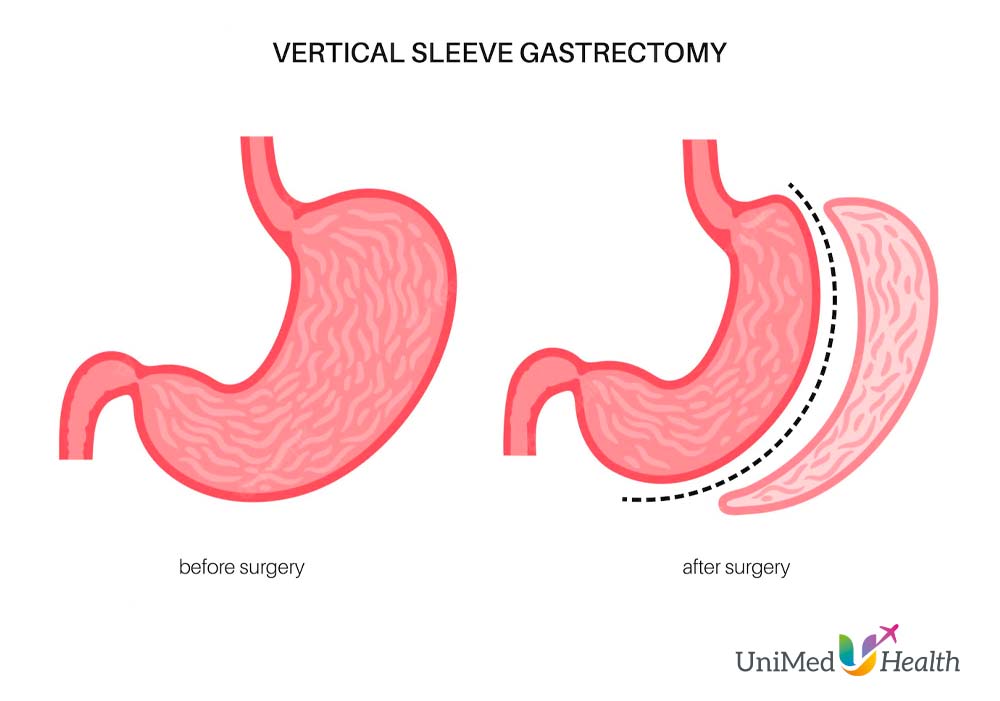
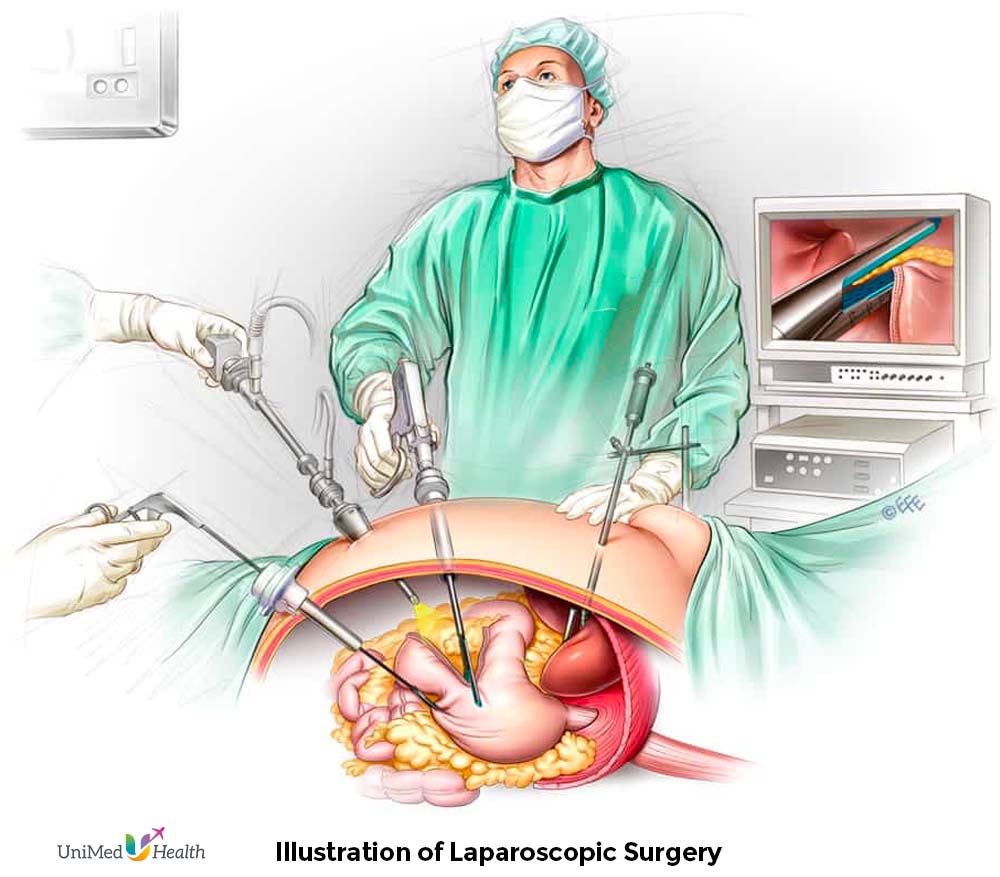
Approximately 80% of the stomach is removed, the remaining stomach volume is 100-150 ml and its shape is roughly tube-like. The surgery reduces the amount of food taken by the patient and the desire to eat, and patients lose weight quickly within the first year. It does this both mechanically and by changing the neurohormanal interaction between the stomach and the brain.
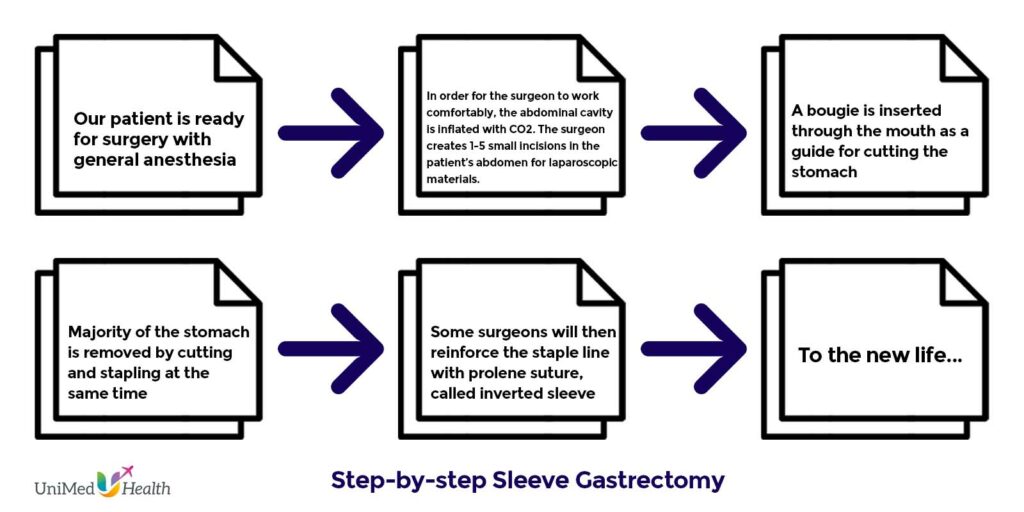
How to lose weight after Sleeve Gastrectomy?
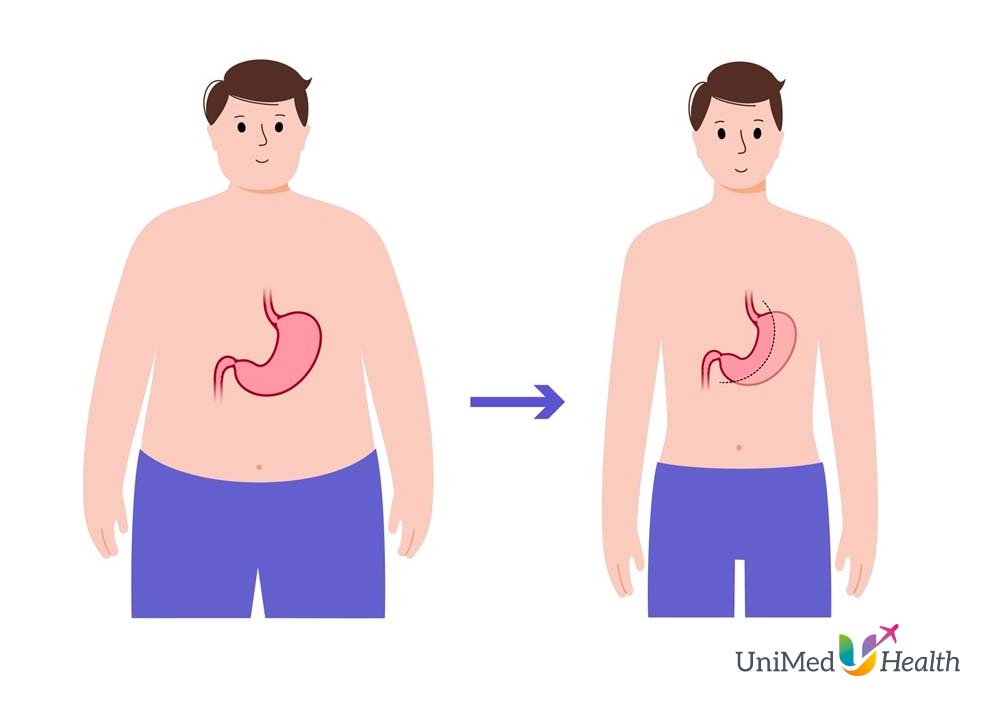
Reduction in stomach capacity: Limits food intake and feels full from smaller-sized portion.
According to studies, Ghrelin hormone, which is secreted from the stomach tissue, increases the appetite, increases fat storage, and encourages to eat more, was found in a lower amount in patients after Sleeve Gastrectomy. Thus, a significant decrease in the appetite of the patients is observed.
After Sleeve Gastrectomy, there is a significant increase in the amount of substances such as GLP-1 and Peptide YY, which work in favor of weight loss and have curative effects on carbohydrate metabolism.
There is an increased sensitivity to the hormone Leptin, which is responsible for feeling full. In obese people, there is a resistance or a decreased response to the functions of Leptin.
How long does Sleeve Gastrectomy surgery take?
Gastric sleeve surgery takes 1 or 1.5 hours on average, but this time may vary depending on the physiological and anatomical characteristics of the patient and the condition of the operating team.
Gastric Sleeve Recovery
Since it is performed laparoscopically, the recovery time after surgery is relatively short. The average discharge time after an uncomplicated surgery is 3 days. It takes about 1 week for the patient to return to his daily routine. However, the patient should avoid heavy exercises for 3 weeks during this period. What is desired by the patients at this point is not a completely sedentary life, the patient should return to his daily life as soon as possible. This is a must for noncomplications of surgeries and a short recovery period.
Weight Loss After Sleeve Gastrectomy
The weight loss process after a sleeve gastrectomy is different for each patient. In this process, diet, exercise and lifestyle changes contribute greatly. If you follow your doctor’s advice, it is not even sincere to lose 60% of your excess weight on average. Most of these weight losses occur in the first year in patients. As we said before, the weight loss process is about the decisions you make and your commitment to those decisions. During this period, our expert bariatric surgeons and dietitians will assist you and the process will be managed by us.

Overview After Sleeve Gastrectomy
Success after sleeve gastrectomy is directly related to long-term strict diet. Patients start a diet with liquids for the first week after surgery. Patients should not consume sugary, fizzy and carbonated liquids. When these liquids reach the stomach, because they cause gas outflow, they will cause a feeling of discomfort that will bloat the stomach. Then, soft watery foods or pureed foods should be consumed for 3 weeks. After 4 weeks, patients can switch to solid foods. Solid foods put pressure on the seams and cause vomiting and stomach discomfort, so they should never be consumed in the beginning. They should not skip meals and consume 3 meals a day. When they reach the feeling of fullness, they should stop eating. The postoperative diet plan of the patients is detailed. For detailed information, you can visit our post op diet page.
Patients are recommended to take muitivitamin twice a day, calcium supplementation once and vitamin B12 injection once a month. The diets of patients should include foods that are low in carbohydrates and rich in protein. Patients should not act fast and chew slowly while eating. Since your body will react to rapid weight loss in the first 3-6 months after surgery, you may experience body aches, feeling extremely tired, mood changes, and also experience dry skin, thinning hair and shedding. These should not scare you, it is normal and temporary to be seen after the surgery, and we should follow your body closely in the first month in this process, so we may need laboratory tests and blood tests. In this process, we follow our patients closely with our dietitians and doctors who are experts in their fields.
Beneficial Of Sleeve Gastrectomy
With laparoscopic sleeve gastrectomy, patients lose weight quickly and effectively. In this way, patients’ obesity-related diseases regress or cure, and patients feel more self-confident, happier and have a more active life.
Obesity-related disease resolution
- Type 2 Diabetes
- Non-alcoholic fatty liver disease (NAFLD)
- Cardiovascular Diseases Obstructive Sleep Apnea
- High Blood Pressure
- Stroke and Heart Attack
Non-obesity-related diseases remission
- Ovarian Disorders
- Musculoskeletal Pain
- Pregnancy and fertility
- Urinary incontinence
- Cancer
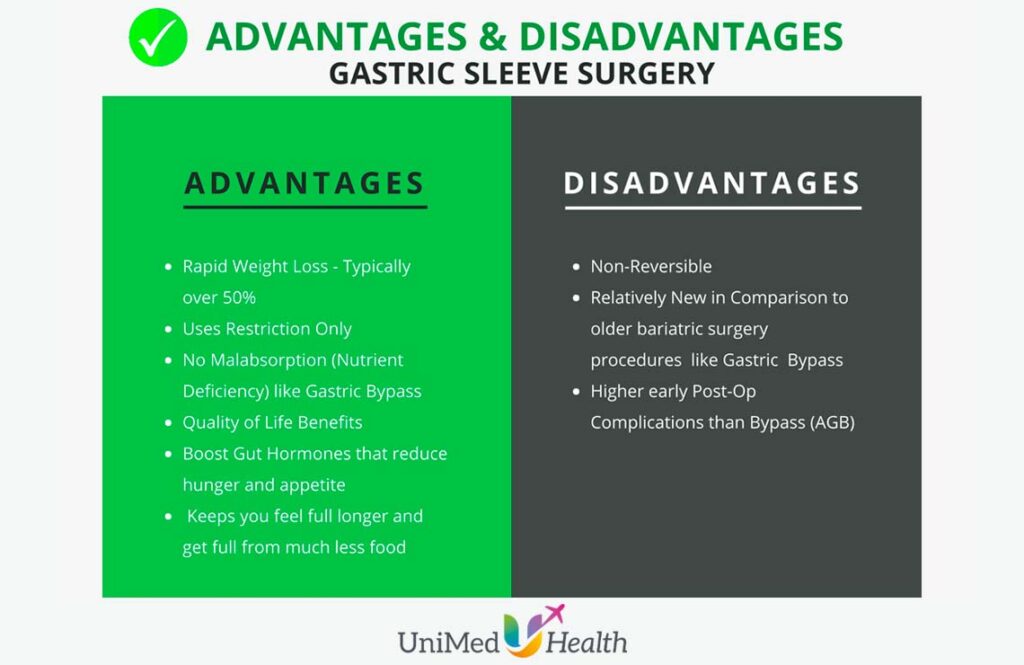
Complications of Sleeve Gastrectomy
Sleeve Gastrectomy is an operation that reduces obesity-related comorbidities and improves the psychosocial status of patients by making patients lose significant weight in a short period of time. However, as in every surgery, it carries some risks for the patient. Our aim is to fully enlighten the patient in this respect, so that our patients can make a rational evaluation in the preoperative process. Complications of sleeve gastrectomy are divided into early and long term. The time period that provides this separation is 30 days.
Early Complications
Bleeding
It usually occurs within the first 24 hours. The patient’s bleeding originates from the surgical wound or stomach. After the operation, the patient is followed up for bleeding. If the patient has bleeding, the follow-up period of the patient is extended. Bleeding after sleeve gatrectomy occurs in approximately one in ten patients. Approximately 85% of patients with bleeding do not require surgical intervention. In addition, depending on the severity of bleeding in this process, needs such as blood transfusion may arise.
Leakage
Leakage after sleeve gastrectomy is a rare but serious problem. It is the case of leakage from the stapler line. When there is leakage, the escape of stomach or intestinal contents into the abdomen causes intra-abdominal infection. If this infective condition is not treated, complications such as intra-abdominal abscess, peritonitis or sepsis may occur. There is an average 2-3% risk of leakage in obesity surgeries. In the case of sleeve gatrectomy, it is seen in approximately one in 200 patients and is generally encountered during the hospitalization period, and rarely within the first 10 days. In order not to encounter such a situation or to manage this situation after encountering it, you should contact bariatric surgeons who are experts in their field.
Blood Clots
Blood clots are a serious condition, although they occur in less than 1% of patients after sleeve gastrectomy surgery. These clots can damage critical organs such as the lungs, heart, and brain. If patients are mobilized in the early period after surgery, this risk is greatly reduced, and patients can use elastic compression stockings that increase blood flow in deep veins. 187 / 5.000
Wound infection
Wound infection may occur within 7-10 days after surgery. It is a relatively easy complication to manage. With regular dressing and antibiotic therapy, patients regain their health.
Abdominal Abcess
Abdominal abscess is a collection of pus occurring in the abdomen, which is seen in an average of 0.5% of patients after surgery. The abscess should be drained and then the patient should be supported with antibiotic therapy. If left untreated, it is dangerous for the patient.
Long Term Complications
Gastrointestinal obstruction
Gastrointestinal obstruction is rare after sleeve gastrectomy. Only 0.6% of patients who underwent 9,726 sleeve gastrectomy operations between 2009 and 2017 developed postoperative obstruction. Patients usually present with symptoms such as abdominal pain, vomiting and inability to pass stool.
Hernias
Hernias can occur at any time after bariatric surgery. The treatment is surgical removal under acute or elective conditions.
Gastroesophageal reflux
Gastroesophageal reflux disease is commonly encountered in surgeries such as sleeve gastrectomy where the size of the stomach is reduced. The shrinkage of the stomach causes pressure, which means the reflux of the grinded food. It is not a life threatening situation. It has symptoms such as bloating and heartburn and chest burning.
Malnutrition
Malnutrition after sleeve gastrectomy is seen in approximately one in 10 patients. Malnutrition can have many causes after surgery. It is the malabsorption of vitamins and minerals, postoperative vomiting and nausea, lack of attention to post-operative diet and additional food supplements. With the post-op diet and supplementary foods prepared by our bariatric dietitians, who are experts in this field, patients are provided with the necessary calories and foods that will prevent nausea and vomiting are preferred in the patients. Prevention is most important, but if it does occur, it needs to be treated aggressively.
